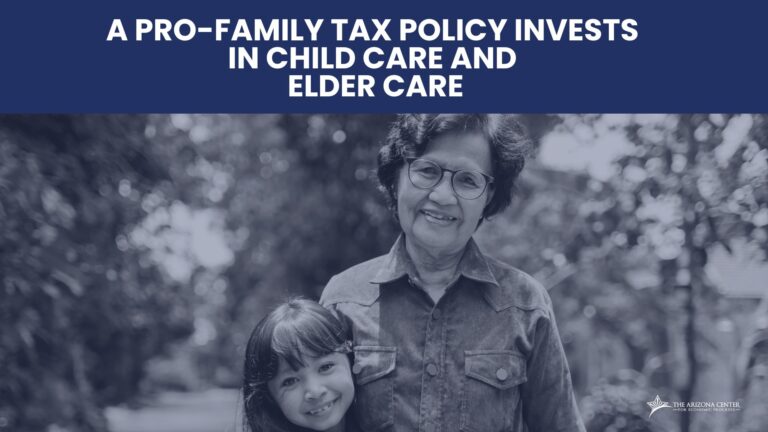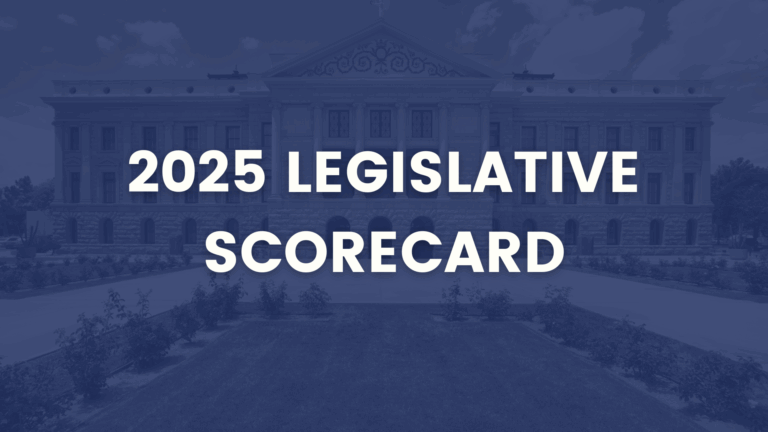
2022 Legislative Session & Budget Recap
Last week, the Arizona Legislature passed a budget and concluded a long and unpredictable 2022 session. This year, politicians at the State Capitol had a historic opportunity to use a massive surplus of resources to make long-overdue investments in Arizona’s people and address the challenges households are facing right now. As budget negotiation began, estimates suggested a state surplus of $1.6 billion in ongoing revenues and $3.7 billion in one-time revenues—this all despite the massive tax cuts for the wealthy that were passed by the legislature last year. In the 2022 session, a lack of resources was no barrier to take on the major, long-term challenges facing the state.
While the legislative session may have wrapped up with the passage of the budget—it’s not the only story.
Undermining the will of the voters (again)
In addition to introducing and considering bills that restrict voting rights for Arizonans, legislators continued to undermine the will and power of the voters by pursuing unpopular policies. Perhaps the best example of this is the passage of House Bill 2853, which would create universal access to Empowerment Scholarship Accounts (ESAs), otherwise known as private school vouchers. For years, education advocate partners have fought against expanding ill-targeted, unaccountable private school vouchers while per-pupil funding for K-12 schools in Arizona remains in the bottom among the US states. In 2018, voters rejected a universal school vouchers bill by a 2-1 margin. Despite the clear message from voters that resources should be directed to public and not private schools, the state legislature went ahead to pass HB 2853.
The legislature also took aim at the initiative process, passing House Concurrent Resolution 2015, which refers to a constitutional amendment as a ballot question to voters that would raise the threshold to approve a tax increase from 50 to 60 percent of votes cast. The initiative, referendum, and recall process are important checks and balances for Arizonans, and changing the threshold undermines voters and would diminish (if not remove) the ability to raise funds for future services and programs.
Some progress, but not a People’s Budget
The final enacted budget was a rare bipartisan agreement, but many opportunities were missed. While some important investments in K-12 (ongoing and one time), affordable housing and homelessness, (one time), and school facilities (one time) were secured as a part of the final agreement, much larger sums of state dollars were misallocated. For example, border enforcement received over $500 million in one-time and $20 million in ongoing funding, while no new supports were provided to support immigrant families and children. In addition, the Department of Corrections and Department of Public Safety (DPS) received over $150 million in ongoing funding and $20 million in one-time funds for the highest salary raises among all state employees, increases to private prison contracts, and a new fleet for DPS. The legislature fell seriously short in restoring funding for higher education (including state operating dollars for Maricopa and Pima community colleges and financial aid for state university students), expanding cash assistance for low-income families, enacting statewide Paid Family and Medical Leave, and identifying a dedicated funding source to support investments in child care.
More corporate giveaways
In 2022, the Arizona Legislature continued its long tradition of prioritizing corporations over people by passing more tax cuts. Senate Bill 1093 and the repeal of the State Equalization Tax Rate cuts property taxes for businesses and shifts the funding for K-12 education to rely more on the General Fund to pay for state programs. The Arizona Legislature also expanded corporate tax credits with the passage of House Bill 2156, which would re-establish a motion picture tax credit—despite the failure of an earlier program to yield the expected return-on-investment.
Important wins that put people first
There were, however, important victories in stopping damaging proposals. The Arizona Legislature did not pass Senate Bill 1643, which would issue tax credits to corporations that have already zeroed out their tax liability through the nonrefundable research and development tax credit. Lawmakers also did not advance House Concurrent Resolution 2031, which would refer a question to the voters to prohibit local governments from establishing city labor standards, instituting programs like paid family medical leave, and setting minimum wages higher than the state minimum wage.
Lawmakers also did not advance rushed, untransparent, harmful proposals to public school funding and operation. Senate Bill 1269 and House Bill 2854 would have changed Arizona’s school funding formula while (in the case of the former) not addressing the state’s low pay for school professionals or steer more resources to students experiencing poverty, and (in the case of the latter) condition more funding on a concurrent expansion of ESAs. In addition, House Bill 2233 would have revived a proposal to restructure the governance of schools with low-performing students, instead of addressing the root causes of student performance in school. All three of these proposals were introduced late in the legislative session but did not ultimately advance.
Key challenges ahead
The 2022 Legislative session may have wrapped up but there are many issues facing Arizona ahead. As legislators at the State Capitol pat themselves on the back for passing a bipartisan budget, their job is far from over. In addition to passing a People’s Budget, members elected this fall will face many challenges next year, including but not limited to:
- Permanently fixing the Aggregate Expenditure Limit – while this year’s budget included significant investments in K-12 public education, school districts will need approval to spend that money and avoid budget cuts next spring. Overriding the AEL requires a two-thirds majority of the Legislature. And if this past year’s AEL fight was any sign, this will not be swift and straightforward.
- Addressing Arizona’s rising cost of living – As of June 2022, approximately 40% of Arizona households are struggling to afford their usual expenses, and the enacted budget does very little to ease the burden, particularly for those with families and with lower incomes.
- Preparing for a potential recession – Many economists suspect that the US might be headed to an economic recession in the coming years. During a recession, state revenues fall short because of less sales tax and income tax collected, ultimately jeopardizing funding for key priorities. During the Great Recession, Arizona’s Legislature chose to make harmful cuts to public programs and services to balance the budget, many of which haven’t been restored to this day. While Arizona has replenished its Rainy Day Fund, a recession may force legislators to make difficult decisions on the state budget, but this time with limited ability to make more cuts.



